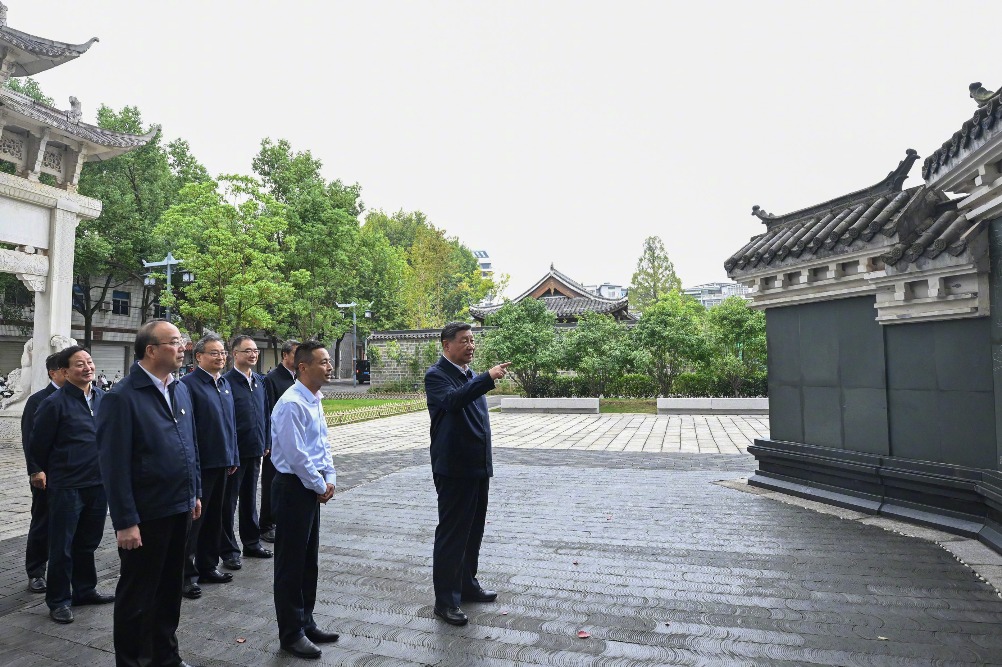Non-Western Principles for a harmonious world order


Editor's note: The world has undergone many changes and shocks in recent years. Enhanced dialogue between scholars from China and overseas is needed to build mutual understanding on many problems the world faces. For this purpose, the China Watch Institute of China Daily and the National Institute for Global Strategy, Chinese Academy of Social Sciences, jointly present this special column: The Global Strategy Dialogue, in which experts from China and abroad will offer insightful views, analysis and fresh perspectives on long-term strategic issues of global importance.
India and China should fall back on the Five Principles of Peaceful Coexistence to reform the prevailing undemocratic and unfair global system of governance
Seventy years ago, a momentous event happened in the annals of international relations. India and China, later joined by other newly independent countries in Asia and Africa, collaborated to create a novel concept in world politics that stood apart from the supremacist belief and haughty behavior of imperialist powers in the West.
The Five Principles of Peaceful Coexistence, or Panchsheel in Sanskrit, called upon all countries to commit themselves to the following in their foreign policy and practice — mutual respect for sovereignty and territorial integrity, mutual nonaggression, noninterference in each other's internal affairs, equality and mutual benefit, and peaceful coexistence.
It was not surprising that these enlightened principles were the crystallized form of the wisdom of two of the world's greatest and most ancient Asian civilizations. The roots of the Five Principles of Peaceful Coexistence lie in the philosophies of China's Taoism and Confucianism, and Buddhism, which originated in India. While being distinct and unique, these philosophies converge at a common point of belief they affirm that diversity, an essential and integral part of human societies, should be respected, while, at the same time, harmony, cooperation and unity should be promoted within the manifold diversities. In Sanskrit, panch means five and sheel stands for virtuous conduct.
It was also not a coincidence indeed, there was a certain synchronicity that both India and China embraced these five wise principles around the same time and then embedded them in a bilateral agreement in 1954. The extant global context was such that the human race had been pining for wisdom after it had come out of the cauldron of two horrendous world wars. Both wars were caused by the rapacious competition and conflict for global domination among Western colonial powers. India won independence in 1947 from the rule of the United Kingdom after 200 years of strenuous struggle under the leadership of Mahatma Gandhi. Two years later, China ended its "hundred years of humiliation" by imperialist powers with the triumph of the revolution under the leadership of Mao Zedong. As the two most populous nations in the world, India and China were expected to show a new path of harmonious coexistence to a world gone weary of wars and violence, while aspiring to prosper together in peace and cooperation.
There was also a third historical factor that necessitated the genesis of the Five Principles of Peaceful Coexistence. Immediately after the end of World War II, the global community was pushed into a new era of division and discord with the start of the Cold War. The United States and the Soviet Union not only began a dangerous nuclear arms race, but also sought to polarize humanity into two rival blocks. This posed a new danger to world peace. It also threatened the independence and sovereignty of nations in Asia, Africa and Latin America that had liberated themselves from the clutches of colonialism. No less baneful was the fact that the Cold War shrank the opportunities for international cooperation, making it difficult for developing and least developed countries to pursue rapid socioeconomic growth, fight poverty, and improve the living conditions of their people.
The seed of the Five Principles of Peaceful Coexistence was planted by two visionary leaders, former Chinese premier Zhou Enlai and former Indian prime minister Jawaharlal Nehru. During Zhou's maiden and historic visit to India, he and the Indian prime minister issued a joint statement on June 28, 1954, which presented to the world a new vision of bilateral and multilateral interaction. This was subsequently incorporated into the declaration adopted by the conference of 29 African and Asian countries in Bandung, Indonesia, in April 1955. It later received universal recognition when the United Nations General Assembly unanimously adopted it in 1957.
The Five Principles of Peaceful Coexistence are no doubt of timeless relevance. Nevertheless, seven decades after they entered into the lexicon of global diplomacy, we must ask ourselves dispassionately: Have they become the norm defining international relations in the 21st century? The answer, clearly, is no.
This is mainly because Western powers, led by the United States, are making a last-ditch effort to maintain their global domination. Even though their economic might is declining, their collective military might, combined with their control of global financial institutions and the media, is still formidable. Believing in the inherent superiority of their political system, they habitually interfere in the internal affairs of countries that follow a different model of governance and a different path of development. Even though they themselves have been the worst violators of human rights in modern history, they give sermons to other countries in this matter.
Western powers also sow seeds of conflict among developing countries and do not lose any opportunity to wage or aid wars of aggression and illegal occupation. They are conspiring to create a new anti-China military bloc in Asia, which, if it succeeds, would be ruinous. One of the starkest examples of their interference in the domestic affairs of other nations is their provocative attempt to prevent the peaceful reunification of the Chinese mainland and Taiwan.
Clearly, the responsibility to reform the prevailing undemocratic and unfair global system of governance in the light of the Five Principles of Peaceful Coexistence cannot be achieved without the active involvement of China and India, the original promoters of this noble concept. Will New Delhi and Beijing heed the call of history? Briefly, here are three ideas we should put into action.
First, India and China will not be able to jointly make any meaningful contribution to the creation of a non-Western, democratic, peaceful and cooperative world order without improving their current strained bilateral relations. For this, they need to find a reasonable and permanent solution to the boundary dispute. This is not impossible if they rediscover the wisdom of their civilizations, which gave birth to the Five Principles of Peaceful Coexistence. This civilizational wisdom will enable them to play a big role in reshaping the history of Asia and the world.
Second, unlike seven decades ago, both China and India are today far more advanced in terms of both the economy and technology, and far more influential in global diplomacy. The two countries should work together on conflict resolution, reforming the global financial architecture, providing development assistance to needy countries, and strengthening the overall voice of the Global South.
Third, both India and China should, along with other members of the international community, make the UN an effective instrument for the implementation of the Five Principles of Peaceful Coexistence. This will undoubtedly lead mankind toward development for all, justice for all and security for all.
The author is an advocate of India-China-Pakistan cooperation for a New South Asia and was an aide to India's former prime minister Atal Bihari Vajpayee. The author contributed this article to China Watch, a think tank powered by China Daily.
The views do not necessarily reflect those of China Daily.
Contact the editor at editor@chinawatch.cn.



































